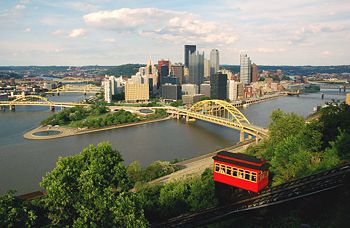Posted on June 8,
2015
Pedal Pusher
Peduto sets Pittsburgh on down cycle
by
Daniel
Clark
“It isn’t the way it was in 1970,” says Pittsburgh
mayor Bill Peduto.
“Not everyone’s dream is to have their own car and use it to get to
work.” Actually, you’d have to go back a
lot farther than 45 years to find a time that having a car was “everyone’s
dream.” The Model T had made that a
reality half a century earlier. By 1970,
it was just a normal facet of life in a civilized Western nation. Well, we can’t have that, now, can we?
Peduto
vowed last September that “Pittsburgh will become a cycling Mecca,” an ambition
that was nowhere to be heard during the previous year’s mayoral campaign. He made this declaration while introducing
his new “bicycle and pedestrian coordinator,” a title that suggests how little
credit liberal politicians typically give their constituents, as if we required
government supervision just to walk down the street.
 The mayor’s plans have since started to take
shape. Several major roads and bridges
around town have been reduced to one lane of traffic in each direction, in
order to make room for the suddenly ubiquitous bike lanes. Curbside bicycle rental stations have popped
up throughout the downtown area, paid for partly with federal tax dollars, in
an attempt to create a demand where none had existed before. An ironically titled project called “Open
Streets Pittsburgh” closes off 25 downtown intersections from automobile
traffic for one Sunday morning every month, so that city streets may be
dedicated to cycling, “healthy activities,” and general snobbery.
The mayor’s plans have since started to take
shape. Several major roads and bridges
around town have been reduced to one lane of traffic in each direction, in
order to make room for the suddenly ubiquitous bike lanes. Curbside bicycle rental stations have popped
up throughout the downtown area, paid for partly with federal tax dollars, in
an attempt to create a demand where none had existed before. An ironically titled project called “Open
Streets Pittsburgh” closes off 25 downtown intersections from automobile
traffic for one Sunday morning every month, so that city streets may be
dedicated to cycling, “healthy activities,” and general snobbery.
Why does the mayor think it’s a good idea to hinder
automobile traffic while encouraging a more primitive mode of
transportation? Because they do it in
Copenhagen. What better reason does a corksniffing elitist need?
Since Peduto visited the Danish capital early
last year, he’s blathered about it in much the same way that Cliff Clavin bores his friends with trivial facts about
Florida. “Copenhagen has 500,000 bike commuters,”
he boasted, according to the Pittsburgh
Tribune-Review. “Forty years ago, it
was just like Pittsburgh,” meaning that it was littered with those bourgeois
motor vehicles. The assumption is that
if a European city has become less like an American city, that cannot help but
be progress.
So how is it that they’ve become so much more
sophisticated in Copenhagen than we are in Pittsburgh? “As infrastructure was built, more people
started to use bikes, and as more people used bikes, more infrastructure was
built.” In other words, the citizens had
always wanted to reject the comfort, efficiency and advanced technology that
automobiles have to offer, but needed their benevolent government to ease the
transition for them. Unsurprisingly,
there’s a little more to it than that.
 Let’s
say you’re in the market for a new car, which in this country might cost you
$20,000. In Denmark, there’s a 105
percent sales tax on cars, until the price reaches a certain threshold, at
which point it jumps all the way to 180 percent. As a result, that same car would cost
somewhere in the neighborhood of $50,000.
Still interested? In addition,
Danish car owners are assessed an annual “green owners tax,” which has a
variable rate depending on the vehicle’s fuel efficiency. As if that weren’t enough, Danes pay among
the highest gasoline prices in the world, thanks to taxes in excess of $3.50
per gallon.
Let’s
say you’re in the market for a new car, which in this country might cost you
$20,000. In Denmark, there’s a 105
percent sales tax on cars, until the price reaches a certain threshold, at
which point it jumps all the way to 180 percent. As a result, that same car would cost
somewhere in the neighborhood of $50,000.
Still interested? In addition,
Danish car owners are assessed an annual “green owners tax,” which has a
variable rate depending on the vehicle’s fuel efficiency. As if that weren’t enough, Danes pay among
the highest gasoline prices in the world, thanks to taxes in excess of $3.50
per gallon.
Contrary to Peduto’s
explanation, people do not freely choose a lower standard of living just
because infrastructure projects have made it more accessible. They do it because they are victims of
government coercion. If the law punished
people for using MP3 players and CDs, it would create a renewed demand for
cassettes, but that wouldn’t mean we preferred them.
Peduto
surely understands this, because the measures he’s taken, though less severe,
are likewise designed to compel a change in behavior. If deliberately exacerbating traffic
congestion and temporarily closing streets for its own sake doesn’t get the
intended results, he and his cycling czar are bound to think of something
worse.
Liberal politicians view progress as anything that
expands the power of authoritarian central planners like themselves. The people they supposedly serve, having
diametrically opposed interests, must therefore be pushed backward. Thus, a society regresses just as its
government becomes more “progressive.” Today,
the people are pressured to trade their cars in for bicycles. Tomorrow, they may be told to turn off their air
conditioners, take three-minute showers, and eat insects. Then, political leaders may approvingly declare,
“It isn’t the way it was in 2015.”
The Shinbone: The
Frontier of the Free Press